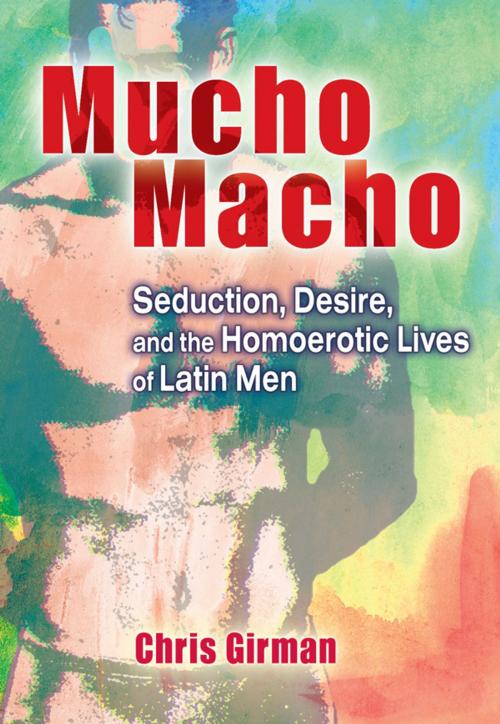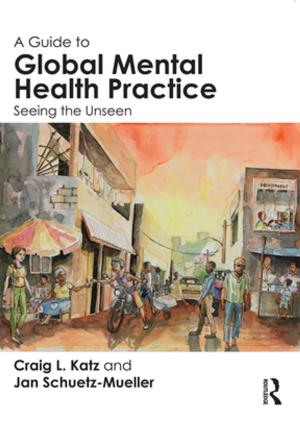Mucho Macho
Seduction, Desire, and the Homoerotic Lives of Latin Men
Fiction & Literature, LGBT, Gay, Short Stories| Author: | Chris Girman | ISBN: | 9781317766032 |
| Publisher: | Taylor and Francis | Publication: | December 16, 2013 |
| Imprint: | Routledge | Language: | English |
| Author: | Chris Girman |
| ISBN: | 9781317766032 |
| Publisher: | Taylor and Francis |
| Publication: | December 16, 2013 |
| Imprint: | Routledge |
| Language: | English |
Quality research-uniquely enhanced by the author’s personal experience!
In one of the first books to examine machismo from the perspective of Latin American and Latino men, Chris Girman relies on a compelling combination of ethnographic research and personal experience to explain how macho men-men like the author himself-regulate and sustain same-sex erotic encounters. Girman incorporates his own sexual experiences with a variety of Latin men into the book, infusing his writing with the unique perspective and vivid description that can only be related by someone who has lived the research he writes about.
While most of the literature on Latin American male same-sex desire ignores the significance of the male body in its investigation, this book shows why it is essential to focus on the macho male body and re-evaluates so-called machismo to forge a more nuanced description of Latin American masculinity. Girman incorporates his own sexual experiences with a variety of Latin American men into the book, infusing his writing with the unique perspective and vivid descriptions that can only be related by someone who has lived the research he writes about.
With this book, you’ll become familiar with various kinds of Latin-American homosexual behavior. Here’s a glimpse at what you’ll find inside:
-
Machismo, Practice Theorists, and Macho Performance summarizes previous research on Latin American male [homo]sexuality and defines the author’s concept of machismo and Latin American masculinity.
-
Head, Hands, Balls, and Ass shows why focusing on the body as living matter, rather than metaphor (as is done in so many other books on sexuality), is the ideal point of entry into the study of Latin American male [homo]sexuality and masculinity. This chapter focuses on specific regions of the macho body-head, hands, balls, and ass-to explain how machismo actually promotes, rather than denies, sexual encounters between men. It also shows the importance of the Latin American family as a variable that structures the manner and frequency in which [homo]sexual encounters occur.
-
The Dominican Tíguere and Hegemonic Masculinities takes a specific look at a very peculiar form of hegemonic masculinity-relying on cunning more than strength to come out on top-that is indigenous to the Dominican Republic. This chapter also tells the stories of five of the author’s sexual encounters in that nation and discusses the tiguere style of masculine performance.
-
Desire in a Costa Rican Prison analyzes the ways in which desire, power, and pleasure are constituted in the Latin American prison environment.
-
Historical Representations of Same-Sex Desire examines two short stories-El Matadero (Esteban Echeverria) and Comienza el Desfile (Reinaldo Arenas), which highlight male eroticism as important concepts within discourses on national identity. Both stories conceptualize same-sex desire within specific historical moments and demonstrate how male [homo]sexuality emerges and represents itself not in contrast to the dominant discourse, but within that discourse itself.
-
Familiar, Familial Voices: Latino Men Speak Out documents the voices of gay-identified Latino men living in Central Texas-men who have come to love other Latin, Black, and Anglo men in the context of very full lives. These men reveal their conceptions of identity, race, performance, resistance, family, pleasure, desire, masculinity, silence, and place.
-
Performing Matter[s]-Masculinity, the Male Body, and the Evocation of the [non]real defies the notion that written representations can capture the lived realities of
Quality research-uniquely enhanced by the author’s personal experience!
In one of the first books to examine machismo from the perspective of Latin American and Latino men, Chris Girman relies on a compelling combination of ethnographic research and personal experience to explain how macho men-men like the author himself-regulate and sustain same-sex erotic encounters. Girman incorporates his own sexual experiences with a variety of Latin men into the book, infusing his writing with the unique perspective and vivid description that can only be related by someone who has lived the research he writes about.
While most of the literature on Latin American male same-sex desire ignores the significance of the male body in its investigation, this book shows why it is essential to focus on the macho male body and re-evaluates so-called machismo to forge a more nuanced description of Latin American masculinity. Girman incorporates his own sexual experiences with a variety of Latin American men into the book, infusing his writing with the unique perspective and vivid descriptions that can only be related by someone who has lived the research he writes about.
With this book, you’ll become familiar with various kinds of Latin-American homosexual behavior. Here’s a glimpse at what you’ll find inside:
-
Machismo, Practice Theorists, and Macho Performance summarizes previous research on Latin American male [homo]sexuality and defines the author’s concept of machismo and Latin American masculinity.
-
Head, Hands, Balls, and Ass shows why focusing on the body as living matter, rather than metaphor (as is done in so many other books on sexuality), is the ideal point of entry into the study of Latin American male [homo]sexuality and masculinity. This chapter focuses on specific regions of the macho body-head, hands, balls, and ass-to explain how machismo actually promotes, rather than denies, sexual encounters between men. It also shows the importance of the Latin American family as a variable that structures the manner and frequency in which [homo]sexual encounters occur.
-
The Dominican Tíguere and Hegemonic Masculinities takes a specific look at a very peculiar form of hegemonic masculinity-relying on cunning more than strength to come out on top-that is indigenous to the Dominican Republic. This chapter also tells the stories of five of the author’s sexual encounters in that nation and discusses the tiguere style of masculine performance.
-
Desire in a Costa Rican Prison analyzes the ways in which desire, power, and pleasure are constituted in the Latin American prison environment.
-
Historical Representations of Same-Sex Desire examines two short stories-El Matadero (Esteban Echeverria) and Comienza el Desfile (Reinaldo Arenas), which highlight male eroticism as important concepts within discourses on national identity. Both stories conceptualize same-sex desire within specific historical moments and demonstrate how male [homo]sexuality emerges and represents itself not in contrast to the dominant discourse, but within that discourse itself.
-
Familiar, Familial Voices: Latino Men Speak Out documents the voices of gay-identified Latino men living in Central Texas-men who have come to love other Latin, Black, and Anglo men in the context of very full lives. These men reveal their conceptions of identity, race, performance, resistance, family, pleasure, desire, masculinity, silence, and place.
-
Performing Matter[s]-Masculinity, the Male Body, and the Evocation of the [non]real defies the notion that written representations can capture the lived realities of















